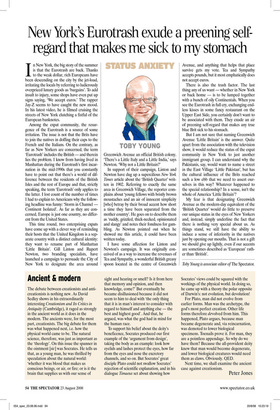New York’s Eurotrash exude a preening self regard that makes me sick to my stomach
In New York, the big story of the summer is that the Eurotrash are back. Thanks to the weak dollar, rich Europeans have been descending on the city by the jet-load, irritating the locals by referring to ludicrously overpriced luxury goods as ‘bargains’. To add insult to injury, some shops have even put up signs saying, ‘We accept euros.’ The rapper Jay-Z seems to have caught the new mood. In his latest video, he is filmed cruising the streets of New York clutching a fistful of the European banknotes.
Among the expat community, the resurgence of the Eurotrash is a source of some irritation. The issue is not that the Brits have to join the natives in doffing their caps to the French and the Italians. On the contrary, as far as New Yorkers are concerned, the term ‘Eurotrash’ includes the British — and therein lies the problem. I know from having lived in Manhattan during the Eurotrash’s first incarnation in the mid-1990s that you constantly have to point out that there’s a world of difference between the residents of the British Isles and the rest of Europe and that, strictly speaking, the term ‘Eurotrash’ only applies to the latter. I lost count of the number of times I had to explain to Americans why the following headline was funny: ‘Storm in Channel — Continent Isolated’. As far as they are concerned, Europe is just one country, no different from the United States.
This time round, two enterprising expats have come up with a clever way of reminding their hosts that the United Kingdom is a separate country with a distinct cultural identity: they want to rename part of Manhattan ‘Little Britain’. Gill Linton and Rupert Newton, two branding specialists, have launched a campaign to persuade the City of New York to designate the area around Greenwich Avenue an official British colony. ‘There’s a Little Italy and a Little India,’ says Newton. ‘Why not a Little Britain?’ In support of their campaign, Linton and Newton have dug up a supercilious New York Times article about the ‘British Quarter’ written in 1902. Referring to exactly the same area in Greenwich Village, the reporter complains about ‘young fellows with bristly brown moustaches and an air of innocent simplicity [who] betray by their broad accent how short a time they have been separated from the mother country’. He goes on to describe them as ‘ruddy, grizzled, thick-necked, opinionated and slangy’ and notes their fondness for gambling. As Newton pointed out when he showed me this article, it could have been written today.
I have some affection for Linton and Newton’s campaign. It was originally conceived of as a way to increase the revenues of Tea and Sympathy, a wonderful British greasy spoon located in the centre of Greenwich Avenue, and anything that helps that place survive gets my vote. Tea and Sympathy accepts pounds, but it most emphatically does not accept euros.
There is also the trash factor. The last thing any of us want — whether in New York or back home — is to be lumped together with a bunch of oily Continentals. When you see the Eurotrash in full cry, exchanging endless kisses in some fancy restaurant on the Upper East Side, you certainly don’t want to be associated with them. They exude an air of preening self-regard that makes any true blue Brit sick to his stomach.
But I am not sure that naming Greenwich Avenue ‘Little Britain’ is the answer. Quite apart from the association with the television show, it would reduce the status of the expat community in New York to just another immigrant group. I can understand why the Pakistanis, say, would want to name a street in the East Village ‘Little Pakistan’, but has the cultural influence of the Brits reached such a low ebb that we need to assert ourselves in this way? Whatever happened to the special relationship? In a sense, isn’t the whole of America ‘Little Britain’?
My fear is that designating Greenwich Avenue as the modern-day equivalent of the ‘British Quarter’ would do little to preserve our unique status in the eyes of New Yorkers and, instead, simply underline the fact that there is nothing very special about us. As things stand, we still have the ability to induce a sense of inferiority in the natives just by opening our mouths. That is not a gift we should give up lightly, even if our accents are sometimes described as ‘European’ rather than ‘British’.


























































 Previous page
Previous page